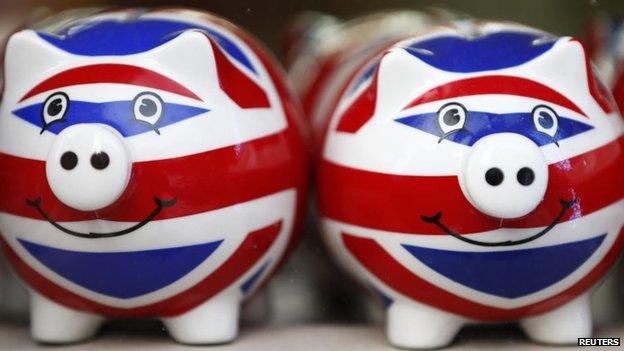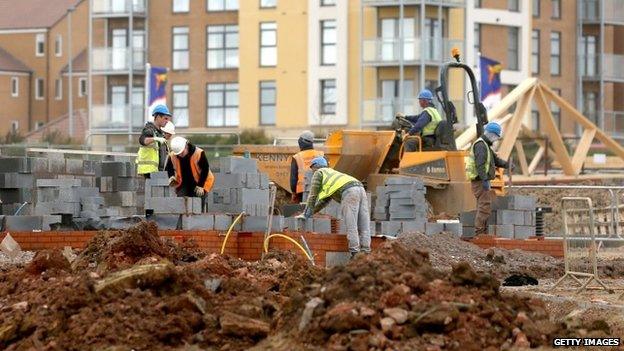Will mortgage and savings rates fall even further?
- Published

The average instant access interest rate is just 0.42% according to the Bank of England
Mortgage and savings rates have been at rock bottom levels for more than five years, ever since the Bank of England cut its Bank Rate to just 0.5%.
Many experts had thought that a rise in Bank Rate would come soon though, as the economy picked up, and that mortgage and savings rates would rise in its wake.
Now, received wisdom has changed, and sharply.
On Wednesday, the Bank, in its quarterly inflation review, surprised some observers by forecasting that inflation will probably fall even lower, and stay there for longer.
The Bank's governor, Mark Carney, forecast that the main measure of inflation might fall below 1% in the coming six months, and that it might also not rise back above the official target level of 2% for another two years.
This suggests that the first small rise in Bank Rate may not happen for at least another year, because if prices do not pick up, there will be little reason for the Bank to use its main anti-inflation weapon - higher interest rates - to keep them down.
So, what are the immediate prospects for mortgage and savings rates?
Five experts give their views.

Sylvia Waycot, Moneyfacts
Moneyfacts more or less invented the concept of the price comparison service for savers and borrowers, back in the days when it was a monthly newsletter, before the advent of the internet.
As such, it has its finger firmly on the pulse of changing rates and conditions for savings accounts and mortgage loans.
Sylvia Waycot reminds us that the government's Funding for Lending Scheme (FLS), which started two years ago, provided lenders with cheap money for up to four years.
And this meant they could slash their savings rates because they just did not need to attract as much money from savers any more.
Waycot says that process is still going on: "Savers' rates in the past few months have still been falling, though not by huge percentages."
"There is also less choice of savings accounts as many providers are rationalising, for instance by offering one cash Isa instead of three," she adds.
Will this go on?
"We just don't know," says Waycot.
"And if rates do rise we are not sure that savers' rates will rise immediately either, as some banks and building societies will still be funded by the FLS money they borrowed."

Andrew Montlake, Coreco mortgage brokers

Low mortgage rates have helped property sales to rise again in 2014
With property sales still rising, arranging mortgages for would-be buyers has become a thriving business again, especially as applying for a home loan has become a much more complicated process than before.
At London-based Coreco, spokesman Andrew Montlake thinks mortgage rates still have a bit further to fall.
In his view the most competitive deals, for people with the biggest deposits, will get close to the previous low point seen about a year ago when, for some borrowers, a five-year fixed rate deal could be had for less than 2.5%.
"I think we will see lenders cut five-year rates below the magical 2.5% level," says Montlake.
"Lenders want to lend and there is more competition in the market, so conditions are conspiring to push rates down," he adds.

Ed Stansfield, Capital Economics
In pondering the future, economist Ed Stansfield cautions against placing too much weight on the recent comments from the Bank of England.
He reminds us that Mark Carney has backtracked on an explicit warning he gave earlier this year, that people were becoming too complacent and that rates might rise as early as this autumn.
"My hunch is that we are probably close to a floor for mortgage rates," says Stansfield.
"I don't think there will be a mortgage price war so rates will probably track sideways until Bank Rate does rise.
"As for savings rates, I don't think they will change unless there is a change in financial market rates - how much lower can savers rates go?" he asks.

Ray Boulger, John Charcol mortgage brokers

A revival of house building has been one beneficial side-effect of the recent rise in mortgage lending
Ray Boulger says the Bank of England's recent comments have not in fact made much difference.
"Many people in the financial markets had already anticipated that the next rate rise would be in the second half of next year," he says.
"So the outlook for interest rates is not significantly different from last week."
Can mortgage rates fall further though? Boulger thinks not.
"It's hard to see mortgage rates falling; in my view rates are on the floor or close to the floor."
As for savers, "their rates are predicated on Bank Rate and as that is unlikely to be cut so savers' rates are unlikely to be cut," he adds.

Bernard Clarke, Council of Mortgage Lenders
The big concern for lenders is how their borrowers will react once mortgage rates do rise.
Even if the big day has been put off to late next year, and the eventual increase comes in small steps, borrowers will still have to pay more.
But before then?
"Mortgage and savers' rates are at a historic low point, so they don't seem likely to go much lower," says Bernard Clarke at the CML.
"However, the courses of mortgage rates will be upwards at some stage, so borrowers need to think about how well prepared they are for that.
"People can't be complacent as we still don't really know when the first rate rise will come - expectations ebb and flow," he adds.